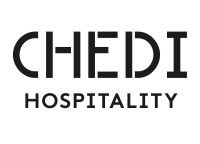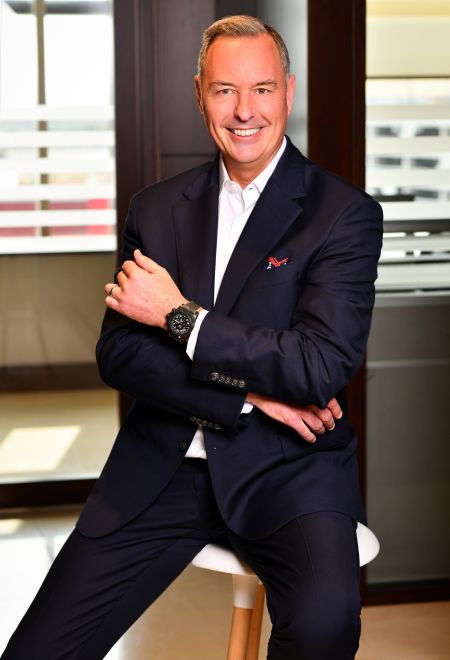
INTERVIEW - STEPHAN SCHUPBACH, CEO, CHEDI HOSPITALITY: "LUXURY IN HERITAGE ENVIRONMENTS IS NOT ABOUT ADDING MORE"
From kitchen to boardroom, the Swiss hospitality leader masters cultural luxury across continents.Catégorie : - Interviews
Interview de Sonia Taourghi le 22-09-2025
|
 Stephan Schupbach became CEO of GHM in November 2023, and maintained his role after the rebranding to Chedi Hospitality in March 2025
His current flagship project, The Chedi Hegra at Saudi Arabia's UNESCO site, perfectly embodies his vision where heritage and nature take centre stage. Under his stewardship, the company has rebranded from GHM to Chedi Hospitality, adopting the evocative tagline "A Voyage Unbound" to reflect its borderless approach to cultural immersion and personal enrichment.
A formative period at The Regent Hong Kong early in his career established Schupbach's exacting standards. At the same time, his transition from chef to management broadened his perspective on how vision, culture and strategy intertwine. His time with Dubai's ruling family at Jumeirah reinforced the importance of aligning operations with cultural narratives. Now, as Chedi Hospitality expands from Dubai to Japan, Schupbach applies his holistic understanding that genuine luxury hospitality creates environments where "culture is honoured, teams thrive, and guests feel part of something larger than themselves."
Journal des Palaces: The GHM to Chedi Hospitality transformation represents a significant evolution. What drove this strategic rebrand, and how does your new tagline reflect the company's future direction as you expand beyond traditional hotel operations?
Stephan Schupbach: Our transformation from GHM to Chedi Hospitality is both a renewal and a natural progression. It was also a strategic shift from a revered hotel management brand into a broader hospitality platform.
Over three decades, The Chedi has become synonymous with understated elegance and cultural depth. Today, our vision goes beyond hotels to encompass residences, lifestyle initiatives, and soon a dedicated F&B vertical.
Our brand essence, "A Voyage Unbound," reflects this future. For our Corporate brand Chedi Hospitality, the Brand Essence: A Voyage Unbound is a platform for expansion. For the guest-facing brand narrative: A Voyage Unbound is a personal and cultural state of being. It speaks about journeys without boundaries, where discovery, cultural connection, and personal enrichment extend far beyond a single stay. It is about crafting spaces and experiences that liberate the spirit, whether through a heritage site in AlUla, a residence in Dubai, or an entirely new way of experiencing gastronomy.
The Chedi Hegra's opening in AlUla's UNESCO World Heritage Site in early 2025 has been a landmark achievement. How did you navigate the complexities of developing within such a culturally sensitive location, and what lessons from this project will inform your approach to future heritage site developments?
Hegra required us to approach hospitality with humility. We were not simply opening a hotel. We were entering a landscape that belongs to humanity. Every decision, from architecture and landscaping to guest experiences, was guided by a commitment to preservation, sustainability, and close collaboration with the Royal Commission for AlUla.
The lesson we carry forward is that in heritage environments, authenticity comes from restraint. Luxury in such places is not about adding more, but about creating a respectful platform where culture and nature take the lead. That philosophy will guide all our future developments in culturally significant destinations.
How does the newly launched Serai brand differentiate itself from The Chedi brand, and what guest demographic is being targeted with this more dynamic approach to luxury hospitality?
The Chedi remains our flag for understated luxury. Serai is deliberately more kinetic: immersive entertainment, reimagined local traditions, and active wellness. Where The Chedi invites contemplation, Serai invites participation. We're targeting high-affinity travellers in their "always-on" years — global professionals, multi-generational families, and culture-curious creators who want energy, community, and performance-minded wellness without sacrificing design integrity.
The Chedi Private Residences in Dubai mark your entry into the residential market. How are you adapting the Chedi hospitality experience for long-term living?
Residences are a natural extension of what we do. Our residents are not only buying a home, they are choosing a lifestyle rooted in service, wellness, and belonging. At The Chedi Private Residences in Dubai, we've translated the refinement of our hotels into daily life through curated experiences, world-class design, and access to Chedi hospitality at home.
Branded residences will play an increasingly central role in the luxury hospitality sector. In a world where mobility is high, they provide permanence and a sense of community while offering the comforts and culture that our guests associate with The Chedi.
Your pipeline includes expansions into East Asia, with projects planned for Japan and China… What criteria guide your destination selection, and how do you ensure the Chedi ethos translates authentically across such diverse cultures?
We select destinations with a strong cultural soul, places where our presence can enhance and not overshadow. Japan is an excellent example, where heritage and craftsmanship resonate with our philosophy of thoughtful luxury. In Europe and the Middle East, we continue to expand in markets where cultural richness and community engagement are at the core.
Authenticity comes from partnership. We collaborate with local architects, artists, and communities to integrate cultural heritage into each project. In this way, the Chedi ethos is translated and always reflective of its setting.
The Chedi Muscat has been an iconic flagship property for the brand, recently recognised among Condé Nast Traveler's Top 15 Middle East hotels. What role do heritage properties play in anchoring your brand identity?
The Chedi Muscat holds a special place in our story. For over two decades, it has embodied refinement, cultural depth, and generosity of space - qualities that remain at the heart of The Chedi. We are proud of the recognition it continues to earn as it reflects the timeless essence of our brand.
Looking ahead, our goal is not to replicate Muscat but to carry forward the spirit it represents into diverse contexts. That ethos now lives across our expanding portfolio, from heritage destinations like Hegra in AlUla, to upcoming developments in Japan to branded residences and a new F&B vertical. Muscat remains an enduring reference point, but the strength of Chedi Hospitality lies in the breadth and resilience of the ecosystem we are building for the future.
What advice would you give to young professionals entering the luxury hospitality industry today? What skills and mindset do you believe are essential for building a successful career in this evolving sector?
Stay curious, stay humble, and invest in emotional intelligence as much as you do in technical skills. Hospitality is fundamentally about people. The ability to listen, adapt, and lead with empathy is what sets you apart. Pair sympathy with confidence in decision-making because empathy without decisiveness leads to drift, and decisiveness without empathy leads to disconnection.
The industry is evolving rapidly, driven by technology, wellness and sustainability. However, the essence of service remains unchanged. Those who can strike a balance between operational excellence and emotional intelligence will thrive. And don't underestimate the importance of work-life balance. It sustains creativity, good judgment, and resilience over the long term.
With your strong leadership team, including CFO Monica Chng, who's been with the company since 2008, what's your philosophy on building and retaining world-class teams across diverse global markets?
People are the true treasure in the hospitality industry. My philosophy is rooted in respect, growth, and a sense of belonging. Respect means valuing colleagues for their humanity, not just their performance. Growth means providing opportunities to learn, experiment, and evolve. Belonging means creating environments where people feel safe, proud, and part of something meaningful.
Monica's long tenure reflects this culture. Today, 70% of our team consists of females, with key languages and diverse cultural backgrounds represented. This diversity strengthens our creativity and our ability to connect with guests worldwide. When people feel they are contributing to a journey larger than themselves, they not only stay, but they thrive. That is the environment we aim to nurture across all our markets.
With nearly four decades in luxury hospitality, including your tenure at Jumeirah, where you rose to VP of Operations, and your previous experience with Ritz-Carlton and One&Only, what has been the most transformative moment in your career that shaped your approach to luxury hospitality leadership?
Luxury hospitality leadership today is about preserving culture, inspiring teams, and creating experiences that endure beyond trends. That philosophy began with my early years in Switzerland, growing up in the family business. This environment instilled in me a respect for craftsmanship, tradition, and the long game of service excellence.
One of my earliest and most formative milestones was working at The Regent Hotel in Hong Kong — then one of the world's top hotels. Immersing myself in such a benchmark property early on set my standards for precision and excellence, values I continue to carry forward.
Early in my career in Colorado, moving from the kitchen into management became another defining shift. As a chef, you learn discipline, precision, and the power of teamwork under pressure. Stepping into management expanded my perspective and taught me how vision, culture, and strategy must come together to create impact beyond the kitchen.
At Jumeirah, I experienced leadership at scale, guiding operations across iconic properties and seeing how a strong culture can inspire teams and elevate guest experiences. I also had the privilege of working closely with Dubai's ruling family to support the destination's global rise. That experience reinforced both my gratitude and the importance of aligning operations with a destination's cultural narrative.
Later, at Doğuş Group, I had the opportunity to shape projects on a much broader canvas, working at the intersection of ownership, development, and brand. My time at Wasl in Dubai further expanded this, as I oversaw a diverse portfolio in one of the world's most competitive markets and learned the importance of balancing investor expectations with long-term brand integrity.
Collectively, these experiences gave me a holistic view: luxury hospitality is not just about creating monuments of design, but about shaping enduring legacies — places where culture is honoured, teams thrive, and guests feel part of something larger than themselves. That belief drives me every day as I lead Chedi Hospitality forward.
|
|